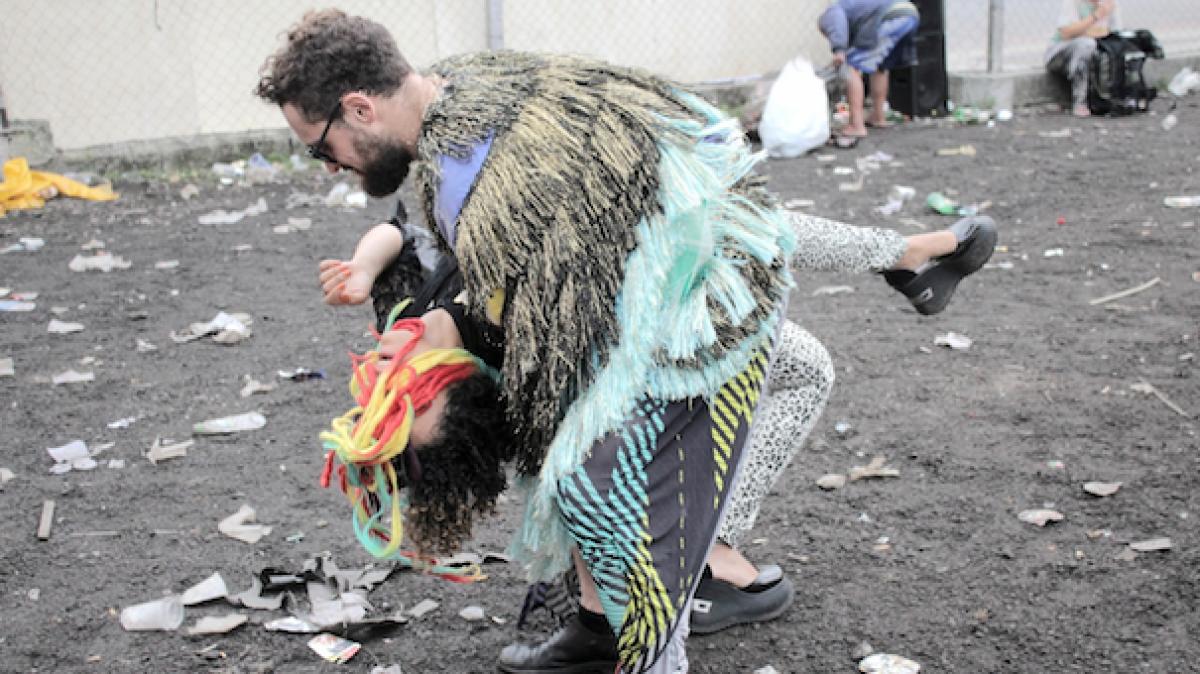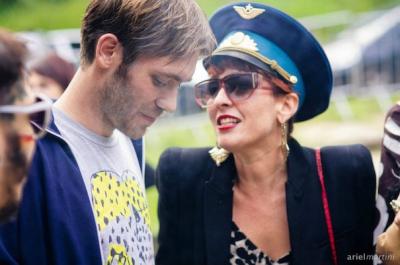
Rewriting Arabic Songs
Using folk songs from Lebanon, Egypt, Palestine, and Kuwait, Yasmine Hamdan’s self-titled new album revives the music of the region with an unheard of frankness and freshness.
Yasmine Hamdan’s music re-addresses Arabic traditions in a way that could almost be seen as an affront to how we perceive the Arab vocal identity. Born in 1976, Hamdan has undertaken the challenge of affirming and rewriting Arabic musical heritage. In her new self-titled album (produced by Kwaidan Records), she continues to demolish the oft used style of verbose praise or lamentations about love, the homeland, nature, pets, last night, and the chosen self (see Norient article on Women and Pop in the Arab World).
«Samar» - Yasmine Hamdan (2012)
Soap Kills
She partnered with Zeid Hamdan in 1997 forming the band Soap Kills. At the time, Beirut was trying to scrub up its schizophrenic glamor with an imaginary soap. Their band was the underground music scene’s response to this.
Soap Kills was a platform for expression in which music was just one element. From the beginning, they worked against illusionary beauty that was «part of the ideology of advanced capitalism and distorted awareness serving social hegemony», as German philosopher and musicologist Theodor Adorno put it. Violations of «socially acceptable» beauty, as Adorno said, become possible through avant-garde music that safeguards the truth. With five albums, Soap Kills consolidated its presence in the Lebanese underground music scene.
«Ya Habibi Taala Lhaeni» (My Love, Come Chase Me)
Fame began with the song Ya Habibi Taala Lhaeni (My Love, Come Chase Me), which was first performed live in 1999. One year later, Umaima al-Khalil presented her interpretation of the same song with musician Hani Siblini in the album Umaima (2000). While both versions of the song claim to modernize the original – sung by Asmahan (1940) with a Turkish tune – the difference was clear between the performances of the two singers.
While Khalil performs the song in a classical aesthetic form but with modern music, Hamdan sings it with a simple voice devoid of classical expressions. Her delivery could even be considered disastrous for its deliberate vocal inconsistency and intentional shifts at the start and end of the musical sentences.
Asmahan (1940)
Video not available anymore.
Soap Kills - Yasmine Hamdan and Zeid Hamdan (1999)
Video not available anymore.
Umaima al-Khalil (2000)
Video not available anymore.
Darine Hamze, Zeid Hamdan, Marc Codsi (2011)
This comparison can also apply to the new album, co-produced by Marc Collin, founder of the band Nouvelle Vague. Over 11 songs, the album revives the region's musical traditions from Lebanon, Egypt, Palestine, Kuwait, and Bedouin heritage. It relies mostly on live instruments and is closer to folk, dominating the pre-arranged electronic music. With an almost unemotional voice, Hamdan, who has been living in Paris with her Palestinian husband, film director Elia Suleiman since 2002, plays with heritage in the most positive sense of the term.
«In Kana Fouadi» (If My Heart…)
The Kuwaiti songs Ours (Wedding) and Samar are sung in a Bedouin accent. Then, as usual, she goes back to the classics of Egyptian music, with her version of Laila Murad’s In Kana Fouadi (If My Heart...), written in the 1940s by Ahmad Rami with music by Sheikh Zakaria Ahmad.
Yasmine Hamdan (2012)
Laila Murad (1937)
Beirut
Her adaptations of the songs play with words and alter the original meanings. She offers an interpretation of «Beirut», recently performed by Ahmad Kaabour in his album Ahmad Kaabour Sings for Omar al-Zaani, where he invokes the people's poet. While Kaabour appears to agree with the image of Beirut that al-Zaani deliberately abuses, Hamdan presents a true picture of Beirut through the poem. She turns the most famous line «Beirut is an untimely flower [zahra]» into «untimely naughty rascal [zaara]».
Yasmine Hamdan (2012)
Ahmad Kaabour (2011)
Y.A.S
Yasmine Hamdan began her musical journey by singing in English with Soap Kills before turning to Arabic, in an attempt to «fill the gap» in the Lebanese music scene. «[It] gave me freedom to sing in my own way», she said in a recent interview with the New York Times. Her background of singing in English later worked against her when she resorted to Arabic. Lebanese radio stations refused to air her songs, especially from the album Bater (2001), and Hamdan turned down offers from European and Arab labels because they wanted her to sing in English. She maintained this stance, even after releasing the last Soap Kills album Inta Fen (Where Are You) (2005) and her first solo Album Arabology (2009).
Y.A.S – «Get it Right» (2009)
Old and New - Other Reprises by Yasmine Hamdan and Soap Kills
Reprise 1
«La Moush» - Yasmine Hamdan (2012)
«La Moush ana illi abki» - Mohammed Abdel Wahhab
Video not available anymore.
Reprise 2
«Ara Salma (I See Salma)» - Zakiyya Hamdan
«Ara Salma - Soap Kills»
Video not available anymore.
«Souleyma» - Rima Khcheich (Lebanese singer, and teacher of Yasmine Hamdan for a short period)
Video not available anymore.
Reprise 3 (see «Samar» by Yasmine Hamdan above)
«Samar» - Kuwaiti Wedding Song
Biography
Shop




Published on July 05, 2012
Last updated on May 01, 2024
Topics
Place remains important. Either for traditional minorities such as the Chinese Lisu or hyper-connected techno producers.
How artists deal with the practice that some call «time-travel» and others «audiotopia».
From westernized hip hop in Bhutan to the instrumentalization of «lusofonia» by Portuguese cultural politics.








